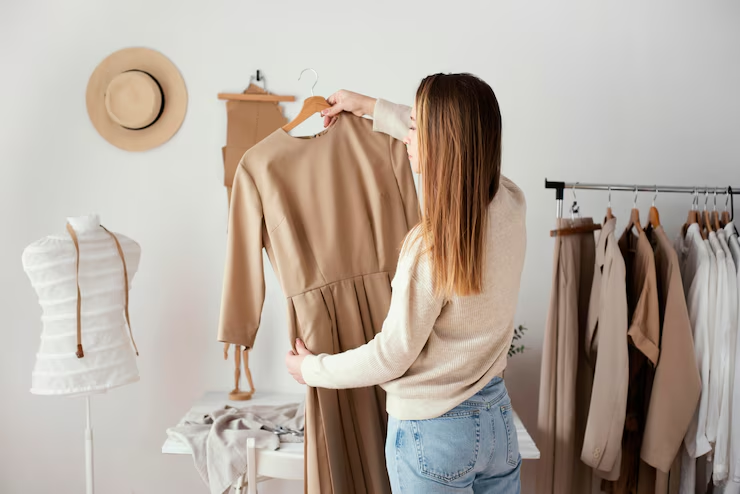Every brand that’s serious about growth eventually has to face a crucial decision: whether to stick with off-the-rack options or work with a private label apparel manufacturers that can bring a distinct identity to life. That shift doesn’t just change the product-it changes the trajectory of the business. Because when the product speaks in your brand’s voice from the fabric up, customers can tell. And more importantly, they remember.
Creating Identity in a Market Full of Clones
Walk through any mid-tier retailer or scroll long enough on e-commerce platforms and it becomes obvious: sameness is everywhere. The same cuts, the same color palettes, the same recycled slogans. Private label isn’t about joining that chorus. It’s about finding your note and holding it, even when trends shift.
That’s why emerging brands are turning toward custom production earlier than ever. It’s not about prestige-it’s about standing out in a crowded space. Working with a manufacturer who gets your tone, your target shopper, and your ambition turns clothing into more than just merch. It becomes signature.
The Myth of “Instant” Fashion
Too many people imagine manufacturing as a simple transaction: send in a sketch, receive a finished garment, launch. In reality, it’s a process-a collaborative, iterative one. Choosing fabrics, refining patterns, adjusting fits, testing wearability. And all of that requires a manufacturer who doesn’t just execute but engages.
The strongest relationships in this business feel more like creative partnerships than contracts. You don’t just need someone with sewing machines. You need someone who will flag design inconsistencies, suggest better material options, and understand how your collection should move, not just look.
Start Small, Think Long
Not every brand has the budget-or the storage-for a 5,000-piece order right out of the gate. But that doesn’t mean they have to compromise on vision. Many private label clothing manufacturers now offer flexible MOQs for growing brands who want to build slowly but smartly.
Starting small can actually be a strength. It forces clarity. Every piece has to earn its place. There’s no room for filler. And when each product is intentional, branding becomes sharper, storytelling easier, and feedback more direct.
This is how great product lines are built-piece by piece, not batch by batch.
Sampling: Where the Real Work Happens
The sample phase is where dreams collide with reality. That cropped blazer that looked flawless in your sketchbook? It might ride up awkwardly or lose structure in your chosen fabric. The oversized hoodie? It might read sloppy if the neckline isn’t reinforced correctly.
And that’s okay-if you’re working with someone who sees sampling as a dialogue, not a checklist. Good manufacturers use this phase to help shape and sharpen the design. They don’t just ask “what do you want?”-they help you figure out what works.
Multiple rounds of samples might feel exhausting, but skipping them means risking thousands on flawed product. And in today’s market, there’s not much room for second chances.
Pattern Grading and Sizing: The Invisible Deal Breaker
Most customers won’t write a review about perfect sizing. But they’ll absolutely write one if the medium fits like a small or the large feels like a tent. Consistent sizing is one of the least glamorous but most essential elements of brand trust.
That’s why investing in thoughtful pattern grading early is worth every cent. A professional manufacturer won’t just scale your sample blindly. They’ll check proportions, advise on grade rules, and help ensure that a size chart isn’t just numbers-it’s experience.
A customer who trusts your sizing becomes a repeat customer. That’s not marketing-it’s math.
Labels, Tags, and the Power of the Finish
Small details don’t just make a garment look finished-they signal that someone cared. A beautifully sewn neck label. A matte tag with a soft-touch logo. Even the choice of thread color on care instructions. These things don’t cost much individually, but together they tell a story of professionalism.
A smart private label manufacturer helps brands think through these touches. Not because they’re necessary, but because they’re meaningful. Customers notice, even if they don’t always realize they do. That’s the power of polish-it builds quiet confidence in the product.
Managing Timelines Without Losing Momentum
Fashion is seasonal, but timelines rarely behave. Delays happen. Fabric shortages, customs backlogs, machinery breakdowns-none of it is fun, and none of it is always avoidable. What matters is how it’s handled.
Reliable manufacturers stay ahead of problems. They give real updates, not excuses. They let you know when something’s slipping and help you adjust, whether that’s pivoting the launch date or tweaking a product to fit new constraints.
This kind of honesty is rare. But when you find it, you hang on tight. Because building a brand is hard enough without playing guessing games with your supply chain.
The Global vs. Local Decision
There’s no universal rule for where your manufacturer should be based. Overseas production often offers more cost-effective options, wider fabric access, and scalable infrastructure. Domestic production offers faster shipping, easier communication, and a marketing edge around “Made Locally” narratives.
Some brands try to do both-special collections made locally, core products overseas. The key is choosing partners who are transparent about capabilities and limitations. It’s better to have a manufacturer who says, “We don’t do denim,” than one who says “Yes” to everything and delivers half-baked results.
Fabric Is the First Decision, Not the Last
Designs often begin visually, but they live or die by texture. A t-shirt with the wrong blend feels disposable. A jumpsuit that clings in the wrong places never gets worn again. That’s why fabric selection can’t be an afterthought.
Experienced manufacturers offer more than just swatches-they offer insight. What shrinks after washing. What pills. What dyes unevenly. The best ones even warn you off certain combinations that seem trendy but behave terribly under real-life conditions.
When fabric is chosen thoughtfully, design becomes easier and fit more forgiving. It’s the quiet cornerstone of every collection.
Beyond Production: What Happens After the Box Ships
Some manufacturers clock out after delivery. Others stay in the loop-asking for feedback, checking on reorders, even flagging potential updates for future runs. That post-production engagement isn’t about upselling. It’s about alignment.
The best relationships in this business aren’t built on volume-they’re built on shared success. If your product line grows, so does your need for consistency, agility, and quality control. A manufacturer who grows with you is worth far more than a dozen one-off contractors.
Brands that last aren’t defined by their first viral drop or perfect Instagram feed. They’re built quietly, through fit consistency, fabric reliability, delivery precision, and product that feels exactly right. None of that happens without the right partner behind the scenes.
Choosing a private label clothing manufacturer isn’t just about filling inventory. It’s about shaping how the world experiences your brand-piece by piece, season by season. And that choice can make all the difference between a label that flickers and one that takes root.





